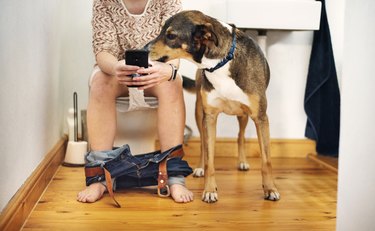
If you spend more time in the bathroom after a workout than you do getting on with your day, you're not alone. Frequent urination after exercise is a common complaint among gym-goers and exercisers. Most of the time, it's completely normal. But it can also point to an underlying medical condition.
Video of the Day
Video of the Day
What’s With All This Urine?
If you're taking extra trips running to the toilet after your trip to the gym, you probably want to know why. The most obvious reason you're peeing a lot after working out is fluid intake, says Los Angeles-based S. Adam Ramin, MD, urologic surgeon and medical director of Urology Cancer Specialists. If you drink to replenish your fluid losses during exercise, you will naturally have increased urine production, Dr. Ramin says.
You may pee more post-workout because your body is working to filter out several byproducts of exercise from the bloodstream, for which your body relies on increased urine production, Dr. Ramin notes. "After exercise, a number of byproducts of muscle activity, including creatinine and lactic acid, need to be filtered out of our bloodstream," he says. And you need an increase in urine production in order to excrete these byproducts.
Exercise also releases hormones like dopamine, aldosterone and endorphins, which can also increase blood flow to the kidneys and stimulate more urine production, according to Jennifer Linehan, MD, urologist and associate professor of urologic oncology at the Saint John's Cancer Institute in Santa Monica, California.
Urine Production During Exercise
Frequent urination after exercise is actually the result of your body doing its job to decrease urine production during your sweat session. "During exercise, increased respiration, heat generation and perspiration all lead to dehydration — and, therefore, decreased urine production," says Dr. Ramin.
Adds R. Mark Ellerkmann, MD, director of the Urogynecology Center at Mercy Medical in Baltimore: "During a workout, blood flow is diverted to the muscles and the skin for cooling. The vasodilation of blood vessels near the surface of the skin allows heat to escape from the body during exercise," he says. Since blood flow is diverted away from the kidneys, there's less blood filtration by the kidneys — and thus less urine production during exercise, Dr. Ellerkmann says.
But after your workout, the situation changes. "We perceive that we urinate more following exercise primarily because when we're resting, the blood flow to the kidneys increases and, as a result, there is more urine production by the kidneys," Dr. Ellerkmann says. Plus, the parasympathetic division is now active, allowing for increases in bowel and bladder activity.
How Often Should You Pee?
How many trips you take to the restroom has many factors beyond just physiology. It could also be a warning sign that something more significant is going on with your health.
"How often you urinate is in direct proportion to how much you drink and if you take certain medications or are drinking beverages that can have a diuretic effect, like coffee or tea or alcohol," says Dr. Linehan.
It also depends on your health. "The presence of renal disease, high blood pressure (use of diuretics or water pills), diabetes insipidus, prostate disease, female pelvic organ prolapse and certain types of cancer can all affect urine output," Dr. Ellerkmann says.
But if you're looking for a threshold, in general, according to the Cleveland Clinic, it's normal to pee about six to eight times in a 24-hour period. As far as the color of urine, Dr. Linehan advises patients that urine should be a light, almost clear yellow color.
But she also points out that a lot of medications and vitamins can cause the urine to be bright shades of yellow or green — or even orange. According to Harvard Health Publishing, urine can also change color from the foods you eat, if you have blood in your urine or as a side effect from a urinary tract infection.
If you're concerned about dehydration, Dr. Ramin adds, be on the lookout for dark yellow urine. "The darker the urine, the more concentrated it is, indicating a dehydrated state, which is a good indication that you should be drinking more water," he says.
- Cleveland Clinic: “What Your Bladder Is Trying to Tell You About Your Health”
- Harvard Health Publishing: “Red, Brown, Green: Urine Colors and What They Might Mean”
- Jennifer Linehan, MD, urologist, associate professor, urologic oncology, Saint John's Cancer Institute, Santa Monica, California
- R. Mark Ellerkmann, MD, FACOG, director, the Urogynecology Center at Mercy Medical, Baltimore
- S. Adam Ramin, MD, urologic surgeon, medical director, Urology Cancer Specialists, Los Angeles
Is this an emergency? If you are experiencing serious medical symptoms, please see the National Library of Medicine’s list of signs you need emergency medical attention or call 911.